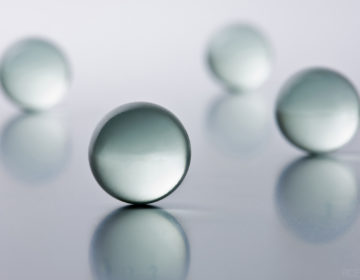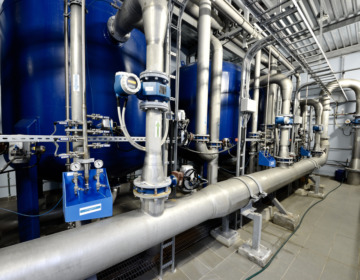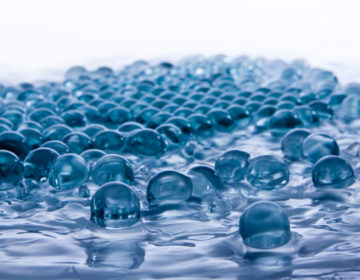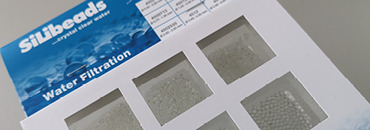Glass beads, also known as filter beads, are an innovative filter medium that is increasingly being used in swimming pool filters. They offer numerous advantages over traditional filter materials such as sand or filter glass. Here are some points that emphasise the use of glass beads as filter balls:
Efficiency
Finer filtration: Glass beads can filter smaller particles than sand, resulting in clearer water.
Lower pressure loss: They allow a lower pressure loss in the filter system, which increases the efficiency of the pumping system.
Economic efficiency
Longer service life: Glass beads need to be replaced less frequently than sand, which saves costs in the long term.
Less water consumption: Less water is required for backwashing as glass beads can be cleaned more efficiently.
Environmentally friendly
Recyclable: Glass beads are an environmentally friendly product that can be reused or recycled.
Chemical reduction: You need fewer chemicals to maintain water quality, which means less impact on the environment.
Handling and maintenance
Less clumping: They are less prone to clumping or forming channels in the filter bed, which improves effectiveness and maintenance.
In use, glass beads are simply filled into the filter container, similar to sand. The specific amount and exact procedure may vary depending on the filter size and type. It is important to follow the manufacturer’s recommendations for optimal results.
Although glass beads can be more expensive to purchase than traditional filter media, the long-term savings and improved water quality often justify the initial cost. For those who value efficiency, sustainability and ease of maintenance, glass beads as filter balls are an excellent choice.
What are the advantages of glass beads over sand for water filtration?
Glass beads offer several advantages over sand in water filtration, making them an attractive alternative for purifying and treating water, especially in swimming pools. Here are some of the main advantages:
- finer filtration
Larger surface area: Glass beads have a smooth and spherical shape compared to sand grains, resulting in a larger effective surface area. This makes it possible to filter finer particles down to a size of around 3 microns, whereas sand can usually filter particles down to a size of around 20-40 microns.
- increased efficiency and energy savings
Lower pressure loss: The uniform shape and size of the glass beads ensure less friction and therefore a lower pressure loss in the filter system. This leads to higher pump efficiency and can save energy costs.
- longer service life and cost efficiency
Chemical resistance: Glass beads are more resistant to chemicals and pH fluctuations than sand. This contributes to a longer filter media life.
Less replacement required: Due to their durability, glass beads need to be replaced less frequently than sand, resulting in long-term cost savings.
- lower water consumption
More efficient backwashing: Glass beads can be backwashed faster and more efficiently than sand, which reduces water consumption during the filter cleaning process.
- environmental friendliness
Recyclability: Glass beads are a more environmentally friendly product. They can be recycled and reused, resulting in a lower environmental impact.
- maintenance benefits
Prevents clumping: Glass beads are less prone to clumping or forming channels for unfiltered water to pass through. This ensures more uniform filtration and simplifies maintenance.
- handling
Dust-free filling: Glass beads are dust-free compared to sand and filter gravel, which makes handling easier when replacing the filter media.
These advantages make glass beads an efficient, cost-effective and environmentally friendly choice for water filtration that can both improve water quality and reduce maintenance.
What are the advantages of glass beads over glass granulate for water filtration?
Glass beads and glass granulate are both popular filter media for water filtration, especially in swimming pools. Both offer significant advantages over traditional sand filter material, but differ in their composition and performance. Here are the specific advantages of glass beads compared to glass granules:
- more uniform filtration
Uniform size and shape: Glass beads tend to be more uniform in size and shape, which creates a very even filtration layer. This allows for more efficient and consistent filtration of small particles.
- reduced pressure drop
Smooth surface: The smooth and spherical surface of glass beads results in less resistance in the filter bed, resulting in lower pressure drop. This can lead to better pump performance and lower energy consumption.
- more efficient backwashing
Less clumping: Due to their smooth surface and spherical shape, glass beads are less prone to clumping. This makes backwashing easier as the material is less likely to form solid channels through which water can pass unfiltered. The result is a more efficient backwashing process that uses less water.
- better water quality
Finer filtration: The uniform shape and size of the glass beads can help to remove finer particles from the water than is possible with glass granulate. This results in better water quality and clarity.
- longer life
Chemical resistance and durability: Although both glass beads and glass granules are chemically inert and durable, the uniform nature of the glass beads can contribute to an overall longer filter media life due to less abrasion and breakage.
- less tendency to form channels
Improved water circulation: The spherical shape of the glass beads promotes better circulation of the water through the filter bed, resulting in more efficient filtration. In contrast, the irregular profile of glass granules can more easily form channels through which water can pass unfiltered.
To summarise, glass beads may be preferred over glass granules for water filtration due to their uniform size and shape, reduced tendency to clump and form channels, and their ability to filter finer particles more efficiently. These properties make them an effective and economical filter medium for applications that require high water quality.







